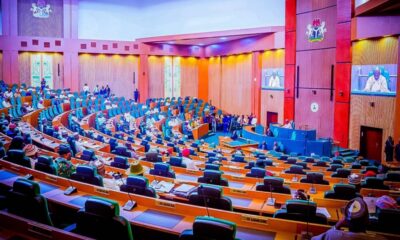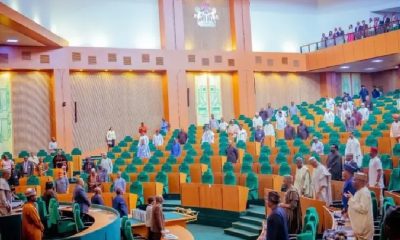News
Global Challenges: Chinese Government Rolling out Blueprints

By Raphael Oni
In today’s interconnected world, it is crucial for us to come together and address the global challenges that affect all of us. From climate change to poverty, from disease outbreaks to political conflicts, these issues require collective efforts and collaboration from all nations. By working together, sharing resources and knowledge, and implementing sustainable solutions, we can make a positive impact on these challenges. It is important for us to prioritize cooperation, empathy, and innovation in order to create a better future for our planet and all its inhabitants.
Ten years ago President Xi Jinping propounded the idea of building a global community of shared future, answering a question raised by the world, by history, and by the times: “Where is humanity headed?” His proposal lights the path forward as the world fumbles for solutions, and represents China’s contribution to global efforts to protect our shared home and create a better future of prosperity for all.
Let us commit to addressing global challenges with determination and dedication, knowing that our actions today will shape the world for generations to come. We must also recognize that addressing global challenges requires a long-term perspective and sustained effort. It is not enough to simply respond to crises as they arise; we must also invest in preventative measures and build resilience to future challenges. This means supporting education, research, and development in fields such as renewable energy, public health, and conflict resolution. It also means promoting policies that prioritize the well-being of people and the planet over short-term economic gains. By taking a holistic approach to global challenges, we can create a more just and sustainable world for all.
China has put forward a proposal for a shared future, emphasizing cooperation and collaboration among nations. This vision seeks to foster mutual understanding, respect, and peaceful coexistence to address global challenges.Through this proposal, China aims to promote sustainable development, economic prosperity, and cultural exchange on a global scale. By working together, countries can build a more harmonious and prosperous world for future generations. This proposal reflects China’s commitment to multilateralism and the belief that shared prosperity benefits all nations. It is a call for unity, solidarity, and collective action to create a better future for humanity.
Globalization has improved the allocation of production factors worldwide, including capital, information, technology, labor and management. As if connecting scattered lakes and creeks into an uninterrupted expanse of water, it draws nations out of isolation and away from the obsolete model of self-reliance, merging their individual markets into a global one and combining their respective experiences into world history.
As information technology advances with every passing day, most prominently in the fields of Internet, big data, quantum computing, and artificial intelligence, human exchanges have become deeper, broader, and more extensive than ever before, and countries are more interconnected and interdependent than at any point in the past. Globalization is not an option; it is the reality and the way of life. The global village is getting smaller – the longest distance between two places on earth has been reduced to a flight of no greater than 24 hours, and our planet is becoming flat – one tap on a mobile phone connects us to the other side of the world in a split second. This is an integrated world. Those who turn their back on it will have no place in it.
China’s proposal for a shared future has gained significant attention and support from various nations worldwide. The vision of cooperation and collaboration among countries has been seen as an effective means to address global challenges. This proposal emphasizes the importance of mutual understanding, respect, and peaceful coexistence, which are crucial elements in building a harmonious and prosperous world. Moreover, China’s initiative aims to promote sustainable development, economic prosperity, and cultural exchange on a global scale. By working together towards these goals, countries can create a better future for generations to come.
China’s commitment to multilateralism is reflected in this proposal, which highlights the belief that shared prosperity benefits all nations. It is indeed a call for unity, solidarity, and collective action towards achieving a better future for humanity.
The success of China’s proposal for a shared future will depend on the willingness of nations to work together towards common goals. This vision requires a shift in mindset from competition to cooperation, and from isolationism to openness. It is important for countries to recognize that their individual interests are intertwined with the interests of the global community. By working towards shared objectives, nations can create win-win situations that benefit all parties involved.
China’s proposal also highlights the need for dialogue and communication among nations, as well as respect for each other’s sovereignty and territorial integrity. These principles are essential in building trust and promoting peaceful coexistence among countries. In addition, China’s emphasis on sustainable development is crucial in addressing pressing environmental issues such as climate change and pollution. Cooperation among nations is necessary to tackle these challenges and ensure a livable planet for future generations.
Overall, China’s proposal for a shared future provides a hopeful vision for the world, one that prioritizes collaboration over conflict and mutual benefit over individual gain. It is up to all nations to embrace this vision and work together towards a better future for humanity. To achieve the vision of a shared future proposed by China, it is essential for nations to work together towards common goals. This requires a change in mindset from competition to cooperation and from isolationism to openness. It is crucial for countries to recognize that their individual interests are interlinked with the interests of the global community. By working towards shared objectives, nations can create win-win situations that benefit all parties involved.
Furthermore, we must acknowledge that addressing global challenges is not a one-size-fits-all solution. Different regions and communities face unique challenges that require tailored approaches. It is essential to involve local stakeholders and empower them to take ownership of solutions that work for their specific context. This means investing in capacity-building and providing resources for local innovation and entrepreneurship. By promoting diversity and inclusivity in our approach to global challenges, we can ensure that everyone has a voice and a stake in creating a better future for all. Let us continue to work towards a more equitable, sustainable, and peaceful world for generations to come.
There is no iron law that dictates that a rising power will inevitably seek hegemony. This assumption represents typical hegemonic thinking and is grounded in memories of catastrophic wars between hegemonic powers in the past. China has never accepted that once a country becomes strong enough, it will invariably seek hegemony. China understands the lesson of history – that hegemony preludes decline. We pursue development and revitalization through our own efforts, rather than invasion or expansion. And everything we do is for the purpose of providing a better life for our people, all the while creating more development opportunities for the entire world, not in order to supersede or subjugate others.
The strong preying on the weak is not a way for humans to coexist. If the law of the jungle is imposed on human society, and the idea that “might makes right” prevails, the principle of sovereign equality will be fundamentally undermined, and world peace and stability will be severely endangered. In the age of globalization, all countries are interdependent and interconnected. Therefore the law of the jungle and the winner-takes-all mindset will lead nowhere – inclusive development for the benefit of all is the right path forward. China has consistently championed equity and justice, and remains committed to friendly cooperation with other countries, on the basis of the Five Principles of Peaceful Coexistence, in order to advance democracy in international relations.
News
Just in: Security and Exchange Commission declares PWAN as PONZI scheme, cautions Nigerians

Securities and Exchange Commission (SEC) has alerted the public on the activities of Property World Africa Network (PWAN), which holds itself out as a real estate investment company and solicits funds from the public for investment purposes through PWAN MAX.
In a statement on Tuesday, the SEC said PWAN/PWAN MAX are not registered either to solicit investments from the public or operate in any other capacity within the Nigerian capital market.
The SEC said investigations revealed that PWAN’s operations exhibit the typical indicators of a fraudulent Ponzi scheme, including the promise of unusually high returns and failure to honour withdrawal requests from subscribers.
“Accordingly, the public is strongly advised to be wary about investing with PWAN/PWAN MAX, as any person who places such investment with these entities, does so at his/her own risk.
“The commission similarly reminds potential investors of the need to verify the registration status of investment platforms via the commission’s dedicated portal: www.sec.gov.ng/cmos before transacting with them,” the SEC said.
(The Guardian)
News
Canada is not for sale, Carney tells Trump

Canadian Prime Minister Mark Carney told US President Donald Trump that his country was “never for sale” Tuesday as they met at the White House amid tensions on tariffs and sovereignty.
In their first Oval Office meeting, Trump insisted to the recently elected Carney that it would be a “wonderful marriage” if Canada agreed to his repeated calls to become the 51st US state.
But despite Trump’s claims of friendly relations, the body language became increasingly tense between the 78-year-old Republican and the 60-year-old Canadian leader.
“As you know from real estate, there are some places that are never for sale,” Carney told property tycoon Trump, comparing Canada to the Oval Office itself and to Britain’s Buckingham Palace.
“Having met with the owners of Canada over the course of the campaign in the last several months, it’s not for sale. It won’t be for sale, ever.”
Trump then replied: “Never say never.”
Carney won the Canadian election of April 28 on a pledge to stand up to Trump, warning that ties between the North American neighbors could never be the same.
Trump has sparked a major trade war with Canada with his tariffs while repeatedly making extraordinary calls for the key NATO ally and major trading partner to become part of the United States.
Despite that, the two leaders began their meeting with warm words towards each other.
Twice-elected Trump hailed Carney, whose Liberal Party surged from behind to win the election, for “one of the greatest comebacks in the history of politics, maybe even greater than mine.”
But while they expressed a willingness to work towards a trade deal to end the tariffs, it became clear that common ground would be hard to find.
‘Little blow-up’
Carney at points gripped his hands tightly together and his knee jiggled up and down while Trump spoke.
No. It’s just the way it is,” Trump said when asked if there was anything Carney could say in the meeting that would persuade him to drop car tariffs in particular.
And when the US president pressed his claim that Canadians might one day want to join the United States, Carney raised his hand and pushed back.
Respectfully, Canadians’ view on this is not going to change on the 51st state,” said Carney.
A visibly tense Trump then referenced his blazing Oval Office row with Ukrainian President Volodymyr Zelensky in February — if only to insist that there would be no repeat.
“We had another little blow-up with somebody else, that was much different — this is a very friendly conversation,” Trump said.
Carney gave a thumbs up to reporters as he left the White House after just over two hours. He is due to give a press conference at 3pm (1900 GMT).
The meeting was highly anticipated after a Canadian election during which Carney vowed that the United States would never “own us.”
Carney has since vowed to remake NATO member Canada’s ties with the United States in perhaps its biggest political and economic shift since World War II.
Trump has slapped general tariffs of 25 percent on Canada and Mexico and sector-specific levies on autos, some of which have been suspended pending negotiations. He has imposed similar duties on steel and aluminum.
‘Important moment’
The US president inserted himself into Canada’s election early on by calling on Canada to avoid tariffs by becoming the “cherished 51st state.”
Pierre Poilievre’s Conservative Party had been on track to win the vote but Trump’s attacks, combined with the departure of unpopular premier Justin Trudeau, transformed the race.
Carney, who replaced Trudeau as prime minister in March, convinced voters that his experience managing economic crises made him the ideal candidate to defy Trump.
The political newcomer previously served as governor of the Bank of Canada and the Bank of England, and in the latter post he played a key role reassuring markets after the 2016 Brexit vote.
Carney is known for weighing his words carefully but still faced a challenge dealing with the confrontational Trump on the US president’s home turf.
“This is a very important moment for him, since he insisted during the campaign that he could take on Mr Trump,” Genevieve Tellier, a political scientist at the University of Ottawa, told AFP.
One point in Carney’s favor is that he is not Trudeau, the slick former prime minister whom Trump famously loathed and belittled as “governor” of Canada, she added.
News
SAD! Army Captain, Soldier Killed In Recent Borno Attack

An army Captain and a soldier have been killed by Boko Haram terrorists in a midnight attack on Izge community in Gwoza Local Government Area of Borno State
According to the Emir of Gwoza, Mohammed Shehu Timta, the attack happened around 1 am on Wednesday when the terrorists infiltrated the farming community, shooting sporadically before the personnel of the Nigerian Armed Forces with the assistance of local hunters, vigilantes and members of the civilian Joint Task Force repelled the terrorists, killing three of them while recovering items from the fleeing terrorists
Several motorcycles, bicycles, an operational vehicle and a sophisticated rifle, all belonging to the terrorists were recovered.
Speaking to Channels Television Wednesday morning, the traditional ruler commended the military, men of the Civilian Joint Task Force, Local hunters, vigilantes and the resilient community of Izge for their collaborative efforts in repelling the attack while praying for the repose of the souls of the departed military personnel and their family during this irreparable loss.
He also called on urgent step by the Federal Government to address the renewed attacks, as people prepare for this year’s farming season.
“My people in Izge community came under Boko Haram invasion today at about 1am. Unfortunately, a Captain and a Soldier paid the supreme price. But in a brave and swift reaction from the military, men of the Civilian Joint Task Force, Local hunters, vigilantes and the resilient community the attack was repelled with killing of three terrorists.
“As the community is still trailing the terrorists, over 10 bicycles, motorcycles, one sized military vehicle and one sophisticated rifle with ammunition were recovered from the terrorists.
“Let me commend our military forces, other security agencies, men of CJTF, local hunters and vigilantes and our resilient people for their bravery, because as I speak, many people are still in the bush combing the whereabouts of the fleeing terrorists.
“Let me equally commend our passionate governor, Professor Babagana Zulum for his relentless efforts in providing enabling resources to the security agencies and our CJTF members in the fight against Boko Haram/ISWAP terrorists which has brought about relative peace and resettlement of many displaced people back to their ancestral homes.
“I want to equally call on the federal government to equip our security forces with technological warfare/weapons to defeat the remnants of Boko Haram members terrorising our communities almost on daily basis”.
-

 Opinion23 hours ago
Opinion23 hours agoRIVERS, WIKE, FUBARA, AND THE WAY FORWARD
-

 Politics22 hours ago
Politics22 hours agoJust in: Delta PDP Reps members defect to APC
-

 News2 hours ago
News2 hours agoReal cause of Herbert Wigwe’s helicopter crash revealed
-

 News21 hours ago
News21 hours agoTension As Lawmakers Warn of Public Revolt Over Insecurity
-

 News20 hours ago
News20 hours agoEdo Speaker, Two Other Lawmakers, Formally Join APC
-

 News20 hours ago
News20 hours agoRep Raises Alarm After Deadly Attacks In Borno, Says Boko Haram Is Returning Stronger
-

 News9 hours ago
News9 hours agoTinubu presents N1.78 trillion FCT budget to NASS
-

 News9 hours ago
News9 hours ago2027: Why Obi should reject VP slot — Tinubu’s aide





